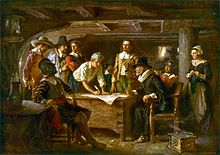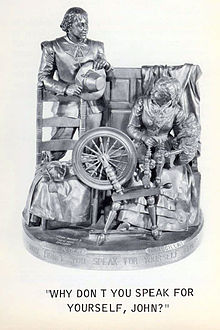John Alden

John Alden (c. 1599 – 1689) [1][2] is said to be the first person from the Mayflower to set foot on Plymouth Rock in 1620.[3] He was a ship-carpenter by trade and a cooper for Mayflower, which was usually docked at Southampton.[4] He was also one of the founders of Plymouth Colony and the seventh signer of the Mayflower Compact. Distinguished for practical wisdom, integrity and decision, he acquired and retained a commanding influence over his associates.[5] Employed in public business he became the Governor's Assistant, the Duxbury Deputy to the General Court of Plymouth, a member under arms of Capt. Miles Standish's Duxbury Company, a member of Council of War, Treasurer of Plymouth Colony, and Commissioner to Yarmouth.[6]
Voyage of the Mayflower

The Mayflower departed Plymouth, England on September 6/16, 1620. The small, 100-foot ship had 102 passengers and a crew of about 30-40 in extremely cramped conditions. By the second month out, the ship was being buffeted by strong westerly gales, causing the ship‘s timbers to be badly shaken with caulking failing to keep out sea water, and with passengers, even in their berths, lying wet and ill. This, combined with a lack of proper rations and unsanitary conditions for several months, attributed to what would be fatal for many, especially the majority of women and children. On the way there were two deaths, a crew member and a passenger, but the worst was yet to come after arriving at their destination when, in the space of several months, almost half the passengers perished in cold, harsh, unfamiliar New England winter.[7]
On November 9/19, 1620, after about 3 months at sea, including a month of delays in England, they spotted land, which was the Cape Cod Hook, now called Provincetown Harbor. After several days of trying to get south to their planned destination of the Colony of Virginia, strong winter seas forced them to return to the harbor at Cape Cod hook, where they anchored on November 11/21. The Mayflower Compact was signed that day.[7][8]
Biography

John Alden was among the original settlers of the Plymouth Colony. Although not himself a Separatist he had been hired to repair Mayflower while she lay off Southampton, England and decided to journey when she set sail, perhaps with the hope of being prosperous in the New World.[4] Alden's engagement with rivaling Indians who plotted to kill newcomers[9] is told elaborately in Henry Wadsworth Longfellow's poem, The Courtship of Miles Standish.
From 1633 until 1675, he was assistant to the governor of the Plymouth Colony, frequently serving as acting governor and also on many juries.
In 1634, Alden was jailed, in Boston, for a fight at Kenebeck in Maine between members of the Plymouth Colony and the Massachusetts Bay Colony. While Alden did not participate in the fight (which left one person dead) he was the highest-ranking member from Plymouth that the Massachusetts Bay colonists found to arrest. It was only through the intervention of Bradford that he was eventually released.[2]
Marriage
John Alden married Priscilla Mullins 12 May 1622. She was the only survivor of the Mayflower Mullins family. They had ten children. Priscilla died in Duxbury between 1651 and her husband’s death in 1687. Both were buried in the Myles Standish Burial Ground in Duxbury, Massachusetts.[1][10][2]
Children of John Alden and Priscilla Mullins
- Elizabeth was born about 1624 and died in Little Compton, Rhode Island on May 31, 1717. She married William Peabody on December 26, 1644 and had thirteen children. The graves of her and her husband are in the Old Commons Cemetery in Little Compton.
- John was born about 1626 and died in Boston on March 14, 1701/2. He married Elizabeth (Phillips) Everill on April 1, 1660 and had fourteen children. He was a survivor of the Salem Witch Trials, of which he wrote a notable account.
- Joseph was born about 1628 and died in Bridgewater on February 8, 1696/7. He married Mary Simmons about 1660 and had seven children.
- Jonathan was born about 1632 and died in Duxbury on February 14, 1697. He married Abigail Hallett on December 10, 1672 and had six children. Jonathan was buried in the Old Cemetery in South Duxbury.
- Sarah was born about 1634 and died before the settlement of her father’s estate in 1688. She married Alexander Standish about 1660 and had eight children.
- Ruth was born about 1636 and died in Braintree on October 12, 1674. She married John Bass in Braintree on February 3, 1657/8 and had seven children.
- Mary was born about 1638. She was still alive and unmarried in 1688.
- Rebecca was born about 1640 and died between June 12, 1696 and October 5, 1722. She married Thomas Delano in 1667 and had nine children.
- David was born about 1642 and died in Duxbury between July 2, 1718 and April 1, 1719. He married Mary Southworth by 1674 and had six children.[1][2]
Final days and legacy


John Alden was the last male survivor of the signers of the Mayflower Compact, and with the exception of Mary Allerton, he was the last survivor of the Mayflower's company. He died at Duxbury[11] on September 12, 1687. Both he and his wife Priscilla lie buried in the Miles Standish Burial Ground.
The Alden residence is also in Duxbury, on the north side of the village, on a farm which is still in possession of their descendants of the seventh generation. He made no will, having distributed the greater part of his estate among his children during his lifetime.[12]
John Alden's House, now a National Historic Landmark, was built in 1653 and is open to the public as a museum. It is run by the Alden Kindred of America, an organization which provides historical information about him and his home, including genealogical records of his descendants. John and Priscilla had the following children who survived to adulthood: Elizabeth, John (accused during the Salem witch trials), Joseph, Priscilla, Robert, Jonathan, Sarah, Ruth, Mary, Rebecca, and David. They have the most descendants today of all the pilgrim families.[5]
Ancestry
There are several theories regarding Alden's ancestry. According to William Bradford’s Of Plimoth Plantation, he was hired as a cooper in Southampton, England, just before the voyage to America. In The English Ancestry and Homes of the Pilgrim Fathers, Charles Edward Banks suggested that John was the son of George and Jane Alden and grandson of Richard and Avys Alden of Southampton. However, there are no further occurrences of the names George, Richard, and Avys in his family which would have been unusual in the seventeenth century.
Another theory is that John Alden came from Harwich, England, where there are records of an Alden family who were related by marriage to Christopher Jones, the Mayflower’s captain. In this case, he may have been the son of John Alden and Elizabeth Daye.
Descendants
The Aldens have many distinguished descendants. They include Presidents John Adams, John Quincy Adams, Henry Wadsworth Longfellow, and many other well known figures in American history.
References
- ^ a b c d A genealogical profile of John Alden (A collaboration between Plymouth Plantation and New England Historic Genealogical Society) /
- ^ a b c d e Robert Charles Anderson, Pilgrim Village Family Sketch of John Alden (A collaboration between American Ancestors and New England Historic Genealogical Society)
- ^ Addison, 1897; p.1
- ^ a b Hawthorne, 2007; p.61
- ^ a b Alden 1867, p.1.
- ^ Society of Colonial Dames, 1897; Section 75
- ^ a b Eugene Aubrey Stratton. Plymouth Colony: Its History and People, 1620-1691, (Salt Lake City: Ancestry Publishing, 1986), p. 413
- ^ George Ernest Bowman, The Mayflower Compact and its signers, (Boston: Massachusetts Society of Mayflower Descendants, 1920). Photocopies of the 1622, 1646 and 1669 versions of the document pp. 7-19.
- ^ Hawthorne, 2007; p.62
- ^ Memorial for John Alden
- ^ Duxbury, in other records, aka. Duxburrough, Duxborough, Duxboro
- ^ Alden 1867, p.2.
Sources
- Alden, Ebenezer. "Memorial of the Descendants of the Hon. John Alden". S.P. Brown, 1867
- Addison, Daniel Dulany. "The Life and Times of Edward Bass, First Bishop of Massachusetts". Houghton, Mifflin, 1897
- National Society of Colonial Dames. "First Record Book of the Society of Colonial Dames", 1897; Ch.75
- Waters, Henry Fitz-Gilbert. "The New England Historical and Genealogical Register". New England Historic Genealogical Society, 1898; p. 435-440
- Longfellow, H.W. "The Courtship of Miles Standish", 1858
- Hawthorne, Julian. "The History of the United States from 1492 to 1910 Volume 1: 1492-1910". BiblioBazaar, LLC, 2007. ISBN 1-4264-8541-7, ISBN 978-1-4264-8541-1.; p. 61-62
External links
- John Alden from MayflowerHistory.com
- John Alden House & Alden Kindred of America
- John Alden at Find A Grave
